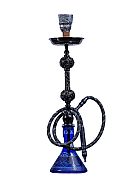- Could Your Grocery Store Meat Be Causing Recurring UTIs?
- Are You Making This Expensive Thermostat Error This Winter?
- Recognizing the Signs of Hypothyroidism
- 10 Strategies to Overcome Insomnia
- Could Artificial Sweeteners Be Aging the Brain Faster?
- Techniques for Soothing Your Nervous System
- Does the Water in Your House Smell Funny? Here’s Why
- Can a Daily Dose of Apple Cider Vinegar Actually Aid Weight Loss?
- 6 Health Beverages That Can Actually Spike Your Blood Sugar
- Treatment Options for Social Anxiety Disorder
Hookahs Deliver Toxic Benzene in Every Puff, Study Shows


Many young people consider hookahs a hip and safer way to smoke, but a new study finds fumes from the water pipes contain the toxin benzene.
Benzene has been linked to an increased risk for leukemia in prior research, according to a scientific team reporting Nov. 21 in the journal Cancer Epidemiology, Biomarkers & Prevention.
“In contrast to what is believed, hookah tobacco smoking is not a safe alternative to smoking other forms of tobacco,” study author Nada Kassem, associate director of the Center for Behavioral Epidemiology and Community Health at San Diego State University, said in a journal news release.
Researchers analyzed levels of S-phenylmercapturic acid (SPMA) — a metabolite (byproduct) of benzene — in the urine of 105 hookah smokers and 103 nonsmokers exposed to smoke from the water pipes.
After an event in a hookah lounge, SPMA levels were four times higher than normal in hookah smokers and 2.6 times higher than normal among people who had attended but hadn’t puffed on a hookah. After a hookah-smoking event in a private home, SPMA levels were two times higher among hookah smokers, but normal among nonsmokers.
“Hookah tobacco smoking involves the use of burning charcoal that is needed to heat the hookah tobacco to generate the smoke that the smoker inhales,” Kassem explained.
“In addition to inhaling toxicants and carcinogens found in the hookah tobacco smoke, hookah smokers and nonsmokers who socialize with hookah smokers also inhale large quantities of charcoal combustion-generated toxic and carcinogenic emissions,” she said.
Kassem believes that “because there is no safe level of exposure to benzene, our results call for interventions to reduce or prevent hookah tobacco use, regulatory actions to limit hookah-related exposure to toxicants including benzene, and include hookah smoking in clean indoor air legislation.”
More information
The U.S. Centers for Disease Control and Prevention has more about hookahs.
Source: HealthDay
Copyright © 2026 HealthDay. All rights reserved.










